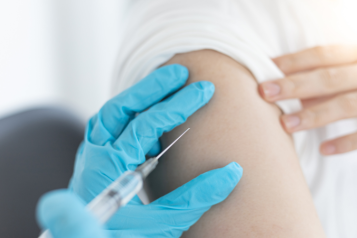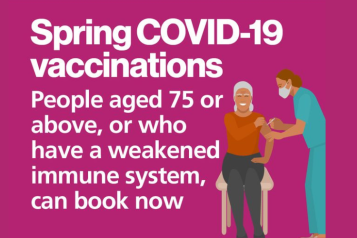Parents encouraged to vaccinate children against flu to avoid serious illness and hospitalisation

Flu can be an unwelcome illness for children, with those under the age of five being more likely to need hospitalisation. Also, as children spread viruses more easily, vaccinating them also protects others who are vulnerable to flu, such as babies and older people.
The flu vaccination is the best way to prevent your child from getting ill this flu season or spreading the virus. Children aged 0 – 17 years with long term conditions and otherwise healthy children aged two - three years old will be offered the vaccine by their GP and all primary aged children will be offered the vaccine at school.
Dr David Crichton, a GP in Doncaster and Chief Medical Officer NHS South Yorkshire, said:
“The vaccine is given to children as a spray squirted up each nostril. The nasal spray flu vaccine is safe and effective and it's quick and painless.
“The flu vaccine does not cause flu in children, but some may have minor symptoms
afterwards, such as a blocked nose, headache or tiredness. These are usually mild. After being vaccinated, your child is less likely to get flu, and if they do, it will be a milder illness.”
If a child is at high risk from flu due to one or more medical conditions or treatments and can’t have the nasal flu vaccine they can have the flu vaccine by injection. Also, for those who may not accept the use of porcine gelatine in medical products, an alternative injectable vaccine is available.
Dr Sonal Kansra, Clinical Lead for the Children and Young People Asthma Programme at Sheffield Children’s Hospital, said: “Flu isn't the same as the common cold. Flu is caused by a different group of viruses and the symptoms tend to start more suddenly, be more severe and last longer.
“Flu can be an extremely unpleasant illness in children. It can be severe in some childhood groups and can lead to serious problems, such as bronchitis and pneumonia which are likely to lead to hospitalisation. We need to protect those children who are more vulnerable and this is one reason why all children aged two – three years are offered the vaccine by their GP.
“It is also really important we vaccinate our children so that they don’t pass it on to others who are more vulnerable, such as their grandparents or baby brothers or sisters.”
Leah Reynolds, a mum from Sheffield, experienced first-hand how badly flu can affect young children when her two-year-old, Isla, became ill with the virus. Leah explains:
“Isla unfortunately caught flu before I was able to take her for the vaccine and
she ended up in hospital as her symptoms were that bad. Isla went floppy and lethargic and had a spiking temperature. She was coughing up mucus and coughing until she was red in the face. I noticed she was really struggling to breathe, and I took her to A&E as I was highly concerned for her health. Seeing Isla in this condition was terrifying.
“I would suggest that parents really consider allowing their child to have the flu vaccine. I personally thought Isla had developed something sinister, that just shows how serious flu symptoms can be. I believe Isla’s symptoms would have been less serious if she had her flu vaccine before she caught it. It took Isla a week to recover which as well as being distressing for her health, also meant she missed a week of nursery, and I missed a week of work.”
If you’ve previously declined the vaccine for your child but now want it, it’s not too late,
please contact your GP to arrange.
For more information on the vaccination for children, please visit
www.nhs.uk/conditions/vaccinations/child-flu-vaccine/

